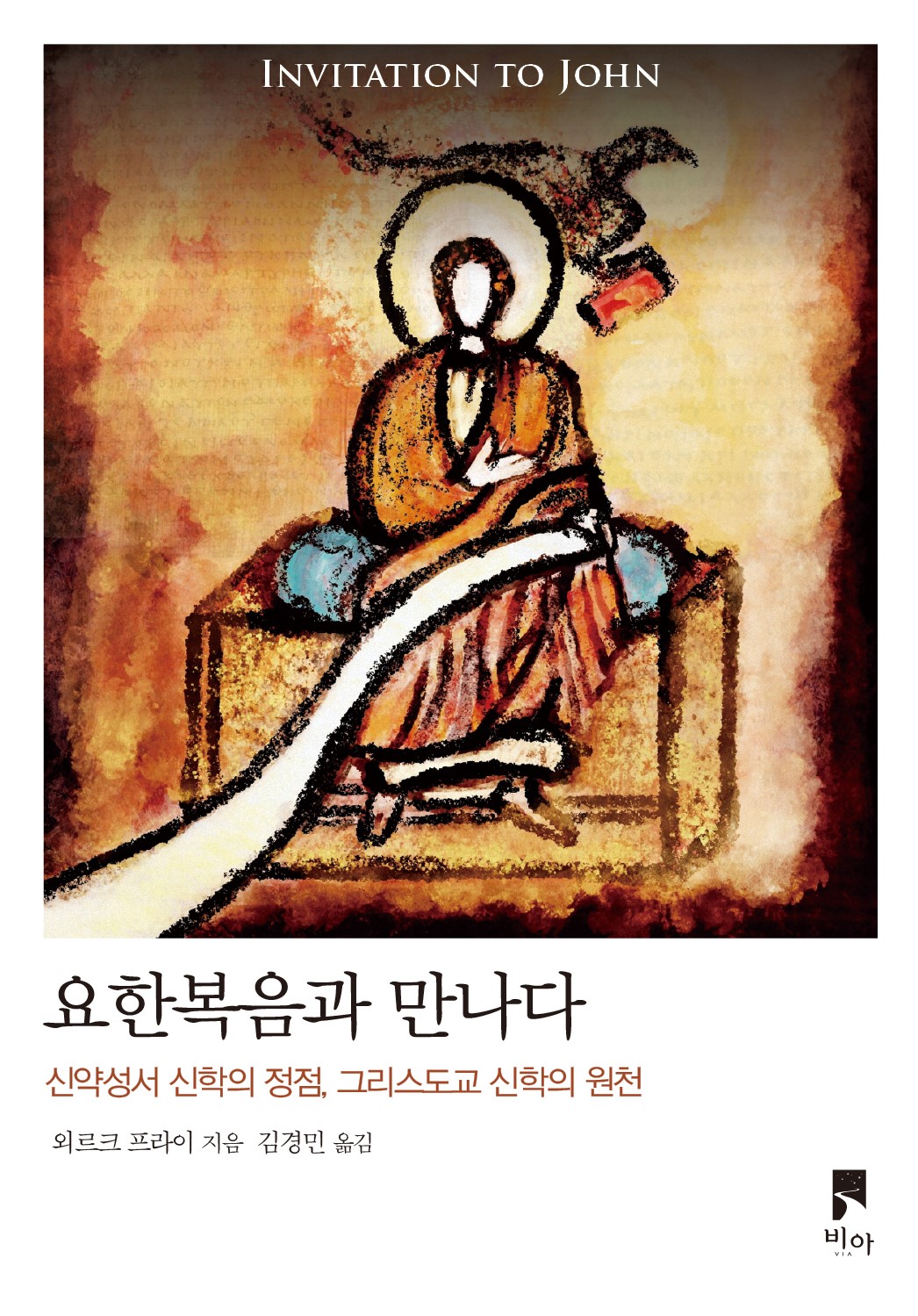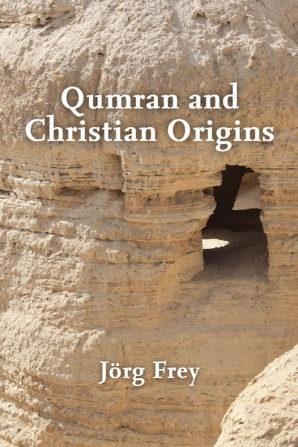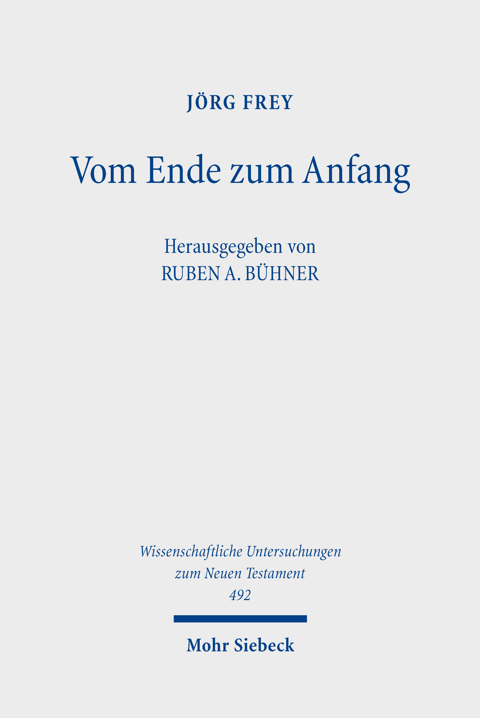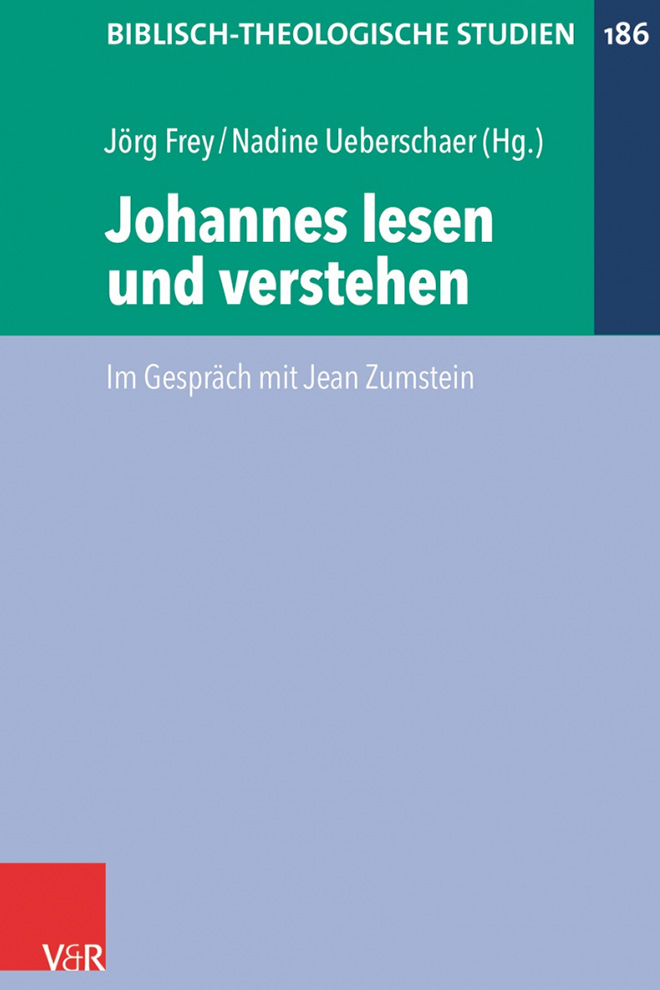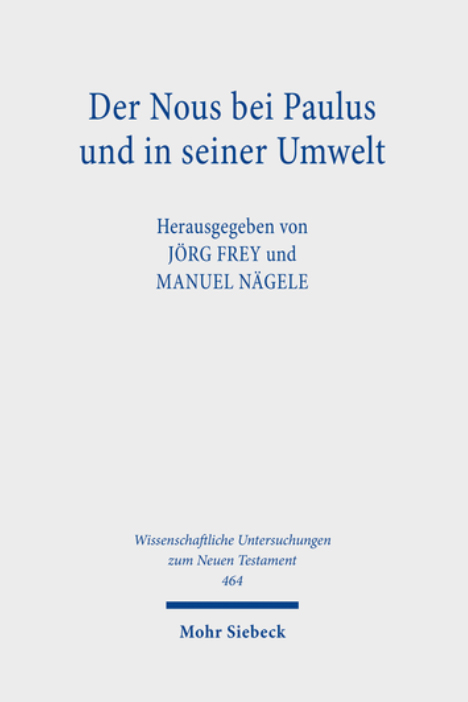Biographisches
Tabellarisches CV als PDF (PDF, 106 KB)
Prof. Dr. Jörg Frey, geboren 1962, studierte an den Universitäten Tübingen und Erlangen sowie in Jerusalem Evangelische Theologie und absolvierte 1988 in Tübingen die 1. Kirchliche Dienstprüfung. In der Folge arbeitete er als Assistent von Prof. Dr. Martin Hengel und Prof. Dr. Hermann Lichtenberger am Institut für antikes Judentum und hellenistische Religionsgeschichte der Universität Tübingen. 1992/93 war Jörg Frey als Vikar der Evangelischen Landeskirche in Württemberg tätig und absolvierte die 2. theologische Dienstprüfung. Er wurde in Tübingen 1996 zum Dr. theol. promoviert und habilitierte sich 1998 dort für das Fach Neues Testament.
Seit 1998 war er Professor für Neues Testament an der Theologischen Fakultät der Friedrich-Schiller-Universität Jena, seit 1999 Ordinarius für Neues Testament mit Schwerpunkt Antikes Judentum an der Evangelisch-theologischen Fakultät der Ludwig-Maximilians-Universität München. Einem Ruf nach Göttingen folgte er 2002 nicht. 2003 wurde er zum Pfarrer der Evangelisch-lutherischen Kirche in Bayern ordiniert. Seit 1. April 2010 ist er Inhaber des Lehrstuhls für Neutestamentliche Wissenschaft mit den Schwerpunkten Antikes Judentum und Hermeneutik an der Theologischen und Religionswissenschaftlichen Fakultät der Universität Zürich. Er ist zugleich Research Associate am Department of Biblical Studies (Old and New Testament) der University of the Free State in Bloemfontein (Südafrika).
Im Januar 2024 erhielt Prof. Dr. Jörg Frey die theologische Ehrendoktorwürde der Universität Uppsala.
Im Februar 2025 erhielt er den Mentoring Award der Universität Zürich für seine Bemühungen in der akademischen Nachwuchsförderung.
Neben einer weit reichenden Herausgebertätigkeit konzentriert sich die Forschung von Prof. Frey auf die Johanneische Literatur, die Katholischen Briefe, das antike Judentum (Qumran, Apokalyptik), das Judenchristentum und die frühchristliche apokryphe Literatur sowie Themen der Exegese und Theologie des Neuen Testaments.
Lehrveranstaltungen
| V-Nr | Lehrveranstaltung | Beginn / Ende | Termin | Dozierende | Raum |
|---|---|---|---|---|---|
| 3131 |
01FS15SF012
|
von 19.09.2025
bis 19.12.2025
|
nach Vereinbarung | Jörg Frey Stefan Krauter | siehe Details |
| 3926 |
01VL14SV031
|
von 15.09.2025
bis 08.12.2025
|
Mo 18:15-19:45, bis 8.12. | Jörg Frey Andreas Benjamin Kilcher Maria Lissek Jill Marxer Konrad Schmid | KIR-2-200 |
| 5320 |
01LE65LB032
|
von 19.09.2025
bis 19.12.2025
|
nach Ankündigung | Jörg Frey | siehe Details |
Prof. Dr. Jörg Frey lehrt im Frühjahrssemester und im Herbstsemester 2025 nicht.
Publikationen
Monographien und Sammelbände
2024
| Invitation to John, Koreanisch, übers. von Kyungmin Kim, Seoul (Via Publishers), 2024. |
|
2022
| Qumran and Christian Origins, Waco TX (Baylor University Press), 2022, 481 S. |
|
2022
| Vom Ende zum Anfang. Studien zum Johannesevangelium, hg. von Ruben Bühner, Kleine Schriften 4, WUNT 492, Tübingen (Mohr Siebeck), 2022, XI + 972 S. |
|
2021
| Tanulmányok az Apokalipszishez, Debreczen 2021, (Studien zur Apokalypse), übers. Hajnalka Ravasz, hg. und mit einem Nachwort von Imre Peres. |
|
2019
Qumran, Early Judaism, and New Testament Interpretation, ed. Jacob N. Cerone, Kleine Schriften III, WUNT 424, Tübingen 2019, XXI + 906 S.
2018
Theology and History in the Fourth Gospel. Tradition and Narration, Waco TX (Baylor University Press), 2018, XIII + 241 S.
The Letter of Jude and the Second Letter of Peter. A Theological Commentary, transl. Kathleen Ess, Waco TX (Baylor University Press), 2018, XLII + 518 S.
The Glory of the Crucified One. Christology and Theology in the Gospel of John, übers. von Wayne Coppins und Christoph Heilig, BMSEC, Waco TX (Baylor University Press) und Tübingen (Mohr Siebeck) 2018, XXXI + 455 S.
2016
Von Jesus zur neutestamentlichen Theologie, hg. von Benjamin Schliesser, Kleine Schriften II, WUNT 368, Tübingen 2016, XI + 940 S.
2015
Der Brief des Judas und der zweite Brief des Petrus, ThHK 15/2, Leipzig (Evangelische Verlagsanstalt), 2015, 366 S.
2014
הבשורה על פי יוחנן׃ מן היהודים ולמען העולם The Gospel according to John. From the Jews and for the World, ed. Cana Werman, with the assistance of Martin Vahrenhorst, Deichmann Studies in Jewish and Christian Literature of the Hellenistic-Roman Era 3, Beersheva (Ben-Gurion University of the Negev Press), 2014, 369 S. (in Ivrit).
2013
Die Herrlichkeit des Gekreuzigten,
hg. von Juliane Schlegel, Studien zu den Johanneischen Schriften I, WUNT 307, Tübingen (Mohr Siebeck), 2013, IX + 886 S.
2000
Die johanneische Eschatologie III. Die eschatologische Verkündigung in den johanneischen Texten, WUNT 117, Tübingen (Mohr Siebeck), 2000, XVII + 600 S.
1998
Die johanneische Eschatologie II. Das johanneische Zeitverständnis, WUNT 110, Tübingen (Mohr Siebeck), 1998, XIV + 369 S.
1997
Die johanneische Eschatologie I. Ihre Probleme im Spiegel der Forschung seit Reimarus, WUNT 96, Tübingen (Mohr Siebeck), 1997, XX + 551 S.
1995
Eugen Drewermann und die biblische Exegese. Eine methodisch-kritische Analyse, WUNT 2, Reihe 71, Tübingen (Mohr Siebeck), 1995, XI + 281 S.
Herausgegebene Themen- und Tagungsbände (seit 2010)
2025
Aspects of Soteriology in John and Paul, ed. Jan G. van der Watt, Joseph Verheyden, and Jörg Frey, WUNT 529, Tübingen (Mohr Siebeck), 2025, XV, 406 S.
Weitere Informationen (Verlagsseite)
Purity in Ancient Judaism. Texts, Contexts, and Concepts, ed. Lutz Doering, Jörg Frey, and Laura von Bartenwerffer, WUNT 528, Tübingen (Mohr Siebeck), 2025, VIII, 427 S.
Weitere Informationen (Verlagsseite)
Open Access DOI 10.1628/978-3-16-164165-7
Revelation and Conflict in John 7 and 8. Historical, Literary, and Theological Readings from the Colloquium Ioanneum 2023 in Vienna, ed. R. Alan Culpepper and Jörg Frey, WUNT 526, Tübingen (Mohr Siebeck), 2025, XVIII, 432 S.
Weitere Informationen (Verlagsseite)
2024
Qumran and the New Testament, ed. Jörg Frey, BETL 340, Leuven (Peeters), 2024, XXVI + 484 S.
Weitere Informationen (Verlagsseite)
Das Johannesevangelium in antik-christlicher Rezeption, hg. von Jörg Frey und Tobias Nicklas, HBE 7, Tübingen (Mohr Siebeck), 2024, VII, 403 S., Open Access.
Weitere Informationen (Verlagsseite)
Open Access DOI 10.1628/978-3-16-163929-6
The Apocalypse of Peter in Context, ed. Daniel C. Maier, Jörg Frey, and Thomas J. Kraus, SECA 21, Leuven (Peeters), 2024, 402 S., Open Access.
Weitere Informationen (Verlagsseite)
2023
Paulusmemoria und Paulusexegese. Römische Begegnungen, hg. von Jörg Frey, Jens Schröter und Martin Wallraff, Rom und der Protestantismus. Schriften des Melanchthon-Zentrums in Rom 5, Tübingen (Mohr Siebeck), 2023.
Open Access DOI 10.1628/978-3-16-162240-3
Paul Within Judaism. Perspectives on Paul and Jewish Identity, ed. Mike Bird, Ruben Bühner, Jörg Frey, and Brian Rosner, WUNT 507, Tübingen (Mohr Siebeck), 2023.
Open Access DOI 10.1628/978-3-16-162440-7
2022
Taufe und Heil im Johannesevangelium, hg. von Jörg Frey und Uta Poplutz, BThS 190, Göttingen (Vandenhoeck & Ruprecht), 2022.
Weitere Informationen (Verlagsseite)
2021
Johannes lesen und verstehen. Im Gespräch mit Jean Zumstein, zusammen mit Nadine Ueberschaer, BThS 189, Göttingen (Vandenhoeck & Ruprecht), 2021, 190 S. |
|
Der Nous bei Paulus und in seiner Umwelt. Griechisch-römische, frühjüdische und frühchristliche Perspektiven, zusammen mit Manuel Nägele, WUNT 464, Tübingen (Mohr Siebeck), 2021, XII + 375 S. |
|
Signs and Discourses in John 5 and 6, zusammen mit Craig R. Koester, WUNT 463, Tübingen (Mohr Siebeck), 2021, VIII + 386 S.
Weitere Informationen (Verlagsseite)
Alexandria: Hub of the Ancient World, zusammen mit Benjamin Schliesser, Jan Rüggemeier und Thomas J. Kraus, WUNT 460, Tübingen (Mohr Siebeck), 2021, L + 621 S.
Weitere Informationen (Verlagsseite)
Perspektiven zur Präexistenz im Frühjudentum und frühen Christentum, hg. zusammen mit Friederike Kunath und Jens Schröter, WUNT 457, Tübingen 2021, X + 421.
Weitere Informationen (Verlagsseite)
2020
Die Rede von Gott Vater und Gott Heiligem Geist als Glaubensaussage. Der erste und der dritte Artikel des Apostolischen Glaubensbekenntnisses im Gespräch zwischen Bibelwissenschaft und Dogmatik, hg. von Anne Käfer, Jörg Frey und Jens Herzer, unter Mitarbeit von Eike Christian Herzig, Tübingen (Mohr Siebeck), 2020.
Petrusüberlieferungen und Petrusarchäologie, zusammen mit Martin Wallraff, Rom und der Protestantismus 2, Tübingen (Mohr Siebeck), 2020.
2019
Autorschaft und Autorisierungsstrategien in apokalyptischen Texten, hg. zusammen mit Michael R. Jost und Franz Tóth, unter Mitarbeit von Johannes Stettner, WUNT 426, Tübingen 2019, XII und 462 S.
Expressions of the Johannine Kerygma in John 2:23 – 5:18. Historical, Literary, and Theological Readings from the Colloquium Ioanneum 2017 in Jerusalem, hg. zusammen mit R. Alan Culpepper, WUNT 423, Tübingen 2019, XVIII und 324 S.
Between Canonical and Apocryphal Texts. Processes of Reception, Rewriting, and Interpretation in Early Judaism and Early Christianity, hg. zusammen mit Claire Clivat und Tobias Nicklas, in Zusammenarbeit mit Jörg Röder, WUNT 419, Tübingen (Mohr Siebeck), 2019, IX + 490 S.
2 Peter and the Apocalypse of Peter: Towards a New Perspective, zusammen mit Matthijs den Dulk and Jan van der Watt, Boston/Leiden (Brill), 2019.
Frauen im antiken Judentum und im frühen Christentum, zusammen mit Nicole Rupschus, WUNT II/489, Tübingen 2019, VIII + 320 S.
2018
Dualismus, Dämonologie und diabolische Figuren. Religionshistorische Beobachtungen und theologische Reflexionen, zusammen mit Enno E. Popkes, unter Mitwirkung von Stephanie Christine Hertel-Holst, WUNT II/484, Tübingen (Mohr Siebeck), 2018, IX + 504 S.
Gleichnisse verstehen. Im Gespräch mit Hans Weder, zusammen mit Esther Marie Joas, BThS 175, Göttingen 2018, 226 S.
Die Rede von Jesus Christus als Glaubensaussage, zusammen mit Jens Herzer und Anne Käfer, UTB 4903, Tübingen 2018, X + 569 S.
2017
The Opening of John’s Narrative (John 1:19-2:22): Historical, Literary, and Theological Readings from the Colloquium Ioanneum in Ephesus, zusammen mit R. Alan Culpepper, WUNT 385, Tübingen (Mohr Siebeck), 2017, XXI + 377 S.
Gottesdienst und Engel im antiken Judentum und frühen Christentum, zusammen mit Michael Jost, WUNT II/446, Tübingen 2017, VIII + 447 S.
Glaube. Das Verständnis des Glaubens im frühen Christentum und in seiner jüdischen und hellenistisch-römischen Umwelt, hg. von Jörg Frey, Benjamin Schliesser und Nadine Ueberschaer, unter Mitarbeit von Kathrin Hager, WUNT 373, Tübingen 2017, XXV + 957 Seiten.
2016
Erzählung und Briefe im johanneischen Kreis, hg. von Uta Poplutz und Jörg Frey, WUNT II/420, Tübingen 2016, VIII + 305 S.
2015
Der Philipperbrief in der hellenistisch-römischen Welt, hg. von Jörg Frey und Benjamin Schließer, unter Mitarbeit von Veronika Niederhofer, WUNT 353, Tübingen 2015, VIII + 422 S.
The Last Years of Paul. Essays from the Tarragona Conference, June 2013, hg. von Armand Puig i Tàrrech, John Barclay und Jörg Frey, unter Mitwirkung von Orrey McFarland, WUNT 352, Tübingen 2015, IX + 606 S.
Jesus, Paulus und die Texte von Qumran, hg. von Jörg Frey und Enno E. Popkes, unter Mitwirkung von Sophie Tätweiler, WUNT II/390, Tübingen 2015, X + 519 S.
2014
The Holy Spirit, Inspiration, and the Cultures of Antiquity. Multidisciplinary Perspectives, hg. von Jörg Frey und John R. Levison, unter Mitwirkung von Andrew Bowden, Ekstasis 5, Berlin/New York 2014, XV + 413 S.
2013
Die Theologie des Paulus in der Diskussion, hg. von Jörg Frey und Benjamin Schließer, BThSt 140, Neukirchen-Vluyn 2013.
Friedrich Avemarie, Neues Testament und frührabbinisches Judentum. Gesammelte Aufsätze, hg. von Jörg Frey und Angela Standhartinger, unter Mitarbeit von Mareike Schmied und Sebastian Weigert, WUNT 316, Tübingen 2013, XXXIII + 966 S.
2012
Narrativität und Theologie im Johannesevangelium, hg. von Jörg Frey und Uta Poplutz, BThS 130, Neukirchen-Vluyn 2012, VIII + 257 S.
Das Böse, JBTh 26 (2011), verantwortlich hg. von Jörg Frey und Gabrielle Oberhänsli-Widmer Neukirchen-Vluyn 2012, 471 S.
Reflections on Early Christian History and Religion – Erwägungen zur frühchristlichen Religionsgeschichte, hg. von Cilliers Breytenbach und Jörg Frey, AJEC 81, Leiden/Boston 2012, XIV + 374 S.
Deutungen des Todes Jesu im Neuen Testament, hg. von Jörg Frey und Jens Schröter, 2., durchgesehene und mit einer neuen Einleitung versehene Auflage, UTB 2953, Tübingen 2012, XXXII + 707 S.
Die Samaritaner und die Bibel. Historische und literarische Wechselwirkungen zwischen biblischen und samaritanischen Traditionen – The Samaritans and the Bible. Historical and Literary Interactions between Biblical and Samaritan Traditions, hg. von Jörg Frey, Ursula Schattner-Rieser und Konrad Schmid, Studia Samaritana 7, Berlin/Boston 2012, X + 450 S.
Die Johannesapokalypse. Kontexte, Konzepte, Wirkungen, hg. von Jörg Frey, James A. Kelhoffer und Franz Tóth, WUNT 287, Tübingen 2012, XI + 867 S.
2011
Qumran und die Archäologie, hg. von Jörg Frey, Carsten Claußen und Nadine Kessler, WUNT 278, Tübingen 2011, XI + 561 S.
Qumran aktuell. Texte und Themen der Schriften vom Toten Meer, hg. von Stefan Beyerle und Jörg Frey, BThS 120, Neukirchen-Vluyn 2011, VII + 293 S.
Der Heilige Geist, JBTh 24 (2009), verantwortlich hg. von Jörg Frey und Dorothea Sattler, Neukirchen-Vluyn 2011, 440 S.
2010
Jesus in apokryphen Evangelienüberlieferungen. Beiträge zu außerkanonischen Jesusüberlieferungen aus verschiedenen Sprach- und Kulturtraditionen, hg. von Jérg Frey und Jens Schröter, unter Mitwirkung von Jakob Spaeth, WUNT 254, Tübingen 2010, XI + 798 S.
Aufsätze in Auswahl (ab 2013)
2025
Jesus’ brothers in John – Hostility or ambivalence? The difficulties of interpreting an enigmatic collective character in John, in: Aspects of Soteriology in John and Paul, ed. Jan G. van der Watt, Joseph Verheyden, and Jörg Frey, WUNT 529, Tübingen (Mohr Siebeck), 2025, 24–44.
“Rivers of Living Water out of His Belly” (John 7:38): On the Structure, Background, and Theological Relevance of an Enigmatic Saying, in: Revelation and Conflict in John 7 and 8: Historical, Literary, and Theological Readings from the Colloquium Ioanneum 2023 in Vienna, ed. R. Alan Culpepper, and Jörg Frey, WUNT 526, Tübingen (Mohr Siebeck), 2025, 181–212.
2024
The Royal Man (John 4:46–54): A Neglected Testimony for John’s High Christology and Paradigm of Faith Development, in: Early High Christology: John among the New Testament Writers (Festschrift Marianne Meye Thompson), ed. Christopher M. Blumhofer, Diane G. Chen, and Joel B. Green, Minneapolis MN (Fortress Press), 2024, 3–16 and 215–219.
The Transformation of the Spiritual Self in Selected Qumran Texts, in: Spiritual Transformation in the New Testament and Related Literature, ed. Albert L. A. Hogeterp, D. Francois Tolmie, and Jan G. van der Watt, WUNT 522, Tübingen (Mohr Siebeck), 2024, 41–56.
Der johanneische Geist-Paraklet und die Frage nach seiner Verleiblichung, EvTh 85 (2024), 338–350.
Josephus’s Account of the Martyrdom of James: A Source for the Position of the Jerusalem Community of Jesus Followers within Their Environment?, in: A Vision of the Days: Studies in Early Jewish History an Historography, in Honor of Daniel R. Schwartz, ed. R. Brody, N. Hacham, M. Piotrkowski, and J. W. van Henten, JSJS 213, Leiden (Brill), 2024, 262–278.
Die Texte von Qumran und die neutestamentliche Wissenschaft nach 75 Jahren: Erträge, Einsichten und Aufgaben, in: Qumran and the New Testament, ed. Jörg Frey, BETL 340, Leuven (Peeters), 2024, 3–33.
Das Johannesevangelium in antik-christlicher Rezeption: Zur Einführung in den Band, in: Das Johannesevangelium in antik-christlicher Rezeption, hg. von Jörg Frey und Tobias Nicklas, HBE 7, Tübingen (Mohr Siebeck), 2024, 1–29.
Open Access DOI 10.1628/978-3-16-163929-6
The Reception of the Gospel of John in the Gospel of Nicodemus/Acts of Pilate (rec. Greek A), in: Faith at the Interface of Cultures: Law and Gospel, Johannine Communities, and Hebrews (Festschrift William Loader), ed. Edwin K. Broadhead, Paul Foster, and Wolfgang Kraus, BZ Supplements 14, Paderborn (Brill Schöningh), 2024, 239–258.
The God who is Love and the Life of Humans: Johannine Perspectives, in: Stellenbosch Journal of Theology, 10/3 (2024), 1–15.
Open Access DOI 10.17570/stj.2024.v10n3.a2
Petrine Traditions and Petrine Authorship Constructions in Early Christianity, in: The Apocalypse of Peter in Context, ed. Daniel C. Maier, Jörg Frey, and Thomas J. Kraus, SECA 21, Leuven (Peeters), 2024, 1–33.
Die johanneische Zeitauffassung in ethischer Perspektive, in: Ethik der Zeit – Zeiten der Ethik. Ethische Temporalität in Antike und Christentum, hg. von Ruben Zimmermann et al., WUNT 510, Tübingen (Mohr Siebeck), 2024, 207–227.
2023
Тумачење Еванђеља по Јовану у новијој науци (The Gospel of John in Recent Research), serbische Übersetzung von Vladan Tatalovic.
Israel’s Scriptures in 1 Peter, Jude, and 2 Peter, in: Israel’s Scriptures in Early Christian Writings. The Use of the Old Testament in the New, ed. Matthias Henze and David Lincicum, Grand Rapids (Eerdmans), 2023, 523–543.
Zwischen Modernität und Apologetik. Exegetische Bemerkungen zu Schleiermachers Johannesvorlesungen, in: Schleiermacher und das Neue Testament. Expeditionen in die Welt seiner exegetischen Vorlesungen, hg. von Andreas Munzinger et al., Berlin (De Gruyter), 2023, 39–70.
The Relativization of Ethnicity and Circumcision in Paul and His Communities, in Paul Within Judaism, ed. Michael Bird et al., WUNT 507, Tübingen (Mohr Siebeck), 2023, 45–62.
Open Access DOI 10.1628/978-3-16-162440-7
Resonanzen polyvalenter Erzählfiguren. Nikodemus und die Samaritanerin in ihrer Rezeption, in: Resonanzen. Gerd Theißen zum 80. Geburtstag, hg. von Petra von Gemünden, Annette Merz und Helmut Schwier, Gütersloh (Gütersloher Verlagshaus), 2023, 48–54.
Christozentrik und neutestamentliche Theologie. Überlegungen zur biblisch-theologischen Verankerung des theologischen Ansatzes von Karl Barth, in: Zentrierte Theologie. Karl Barths Beitrag zur Verständigung der theologischen Disziplinen, hg. von Georg Pfleiderer, Christiane Tietz und Matthias Wüthrich, Theologische Anstösse 10, Göttingen (Vandenhoeck & Ruprecht/Brill Deutschland), 2023, 19–44.
Open Access DOI 10.13109/9783666557996
Der Monogenes zwischen Aqeda und Athena. Zu Semantik und Kontext eins einzigartigen Christusprädikats, in: Von der Antike begeistert! Philologie, Philosophie, Religion und Politik durch drei Jahrtausende (Festschrift Christoph Riedweg), hg. von Camille Semenzato und Lucius Hartmann, Basel (Schwabe Verlag), 2023, 281–290.
2022
Anti-Judaism, Philosemitism and Protestant New Testament Studies. Perspectives and Questions, in: Protestant Bible Scholarship: Antisemitism, Philosemitism and Anti-Judaism, ed. Arjen F. Bakker, René Bloch, Yael Fisch, Paula Fredriksen, and Hindy Najman, JSJS 200, Leiden (Brill), 2022, 149–181.
Open access https://brill.com/edcollbook-oa/title/60764
Gottes Offenbarung in Jesus Christus. Zur theologischen Bedeutung von Joh 1,18, in: Über Gott, Festschrift für Reinhard Feldmeier zum 70. Geburtstag, hg. von Jan Dochhorn, Rainer Hirsch-Luipold und Irina Tanaseanu-Döbler, Tübingen (Mohr Siebeck), 2022, 223–246.
The Impact of the Qumran and Nag Hammadi Discoveries on New Testament Scholarship: Dualism in John and Jesus’s Eschatology as Paradigms, in: The Dead Sea Scrolls and the Nag Hammadi Codices: Selected Papers from the Conference “The Dead Sea Scrolls and the Nag Hammadi Codices” in Berlin, 20–22 July 2018, ed. Dylan M. Burns and Matthew J. Goff, NHMS 103, Leiden (Brill), 2022, 66–92.
Qumrân et le Nouveau Testament, übers. von David Hamidovic, Le Monde de la Bible 242, Sept/Oct/Nov 2022, 54–61.
Heilvolle Zeit? Linear und existential verstandene Zeit in der Auslegung des Johannesevangeliums bei Oscar Cullmann und Rudolf Bultmann, in: Rudolf Bultmann, Oscar Cullmann. Briefwechsel 1926–1967. Studien zum theologischen und exegetischen Austausch, hg. von Michael Jost, Martin Sallmann und Benjamin Schliesser, Tübingen (Mohr Siebeck), 2022, 191–217.
Vom Sinn der Apokalyptik, ihrem Gebrauch und ihrem Missbrauch. Biblisch-theologische Perspektiven im aktuellen Horizont, Theologische Beiträge 53 (2022), 280–296.
Who Is Nathanael? Or Who Can Nathanael Be for Readers of John? Reception History and Biblical Scholarship in Dialogue, in: The Gospels and their Receptions, ed. Christopher M. Tuckett and John Kloppenborg (Festschrift Joseph Verheyden), BETL 330, Leuven (Peeters), 2022, 311–335.
Die Taufe im Johannesevangelium: Forschungsgeschichtliche Perspektiven, in: Taufe und Heil im Johannesevangelium, in: Taufe und Heil im Johannesevangelium, hg. von Jörg Frey und Uta Poplutz, BThS 190, Göttingen (Vandenhoeck & Ruprecht), 2022, 1–34.
Was heist es, einen Kommentar zu schreiben. Reflexionen im autobiographischen Horizont, in: Heilige Schriften in der Kritik. XVII. Europäischer Kongress für Theologie (5.–8. September 2021 in Zürich), hg. von Konrad Schmid, Veröffentlichungen der Wissenschaftlichen Gesellschaft für Theologie 68, Leipzig (Evangelische Verlagsanstalt), 2022, 287–306.
2021
From Eternal Life to the Word That Was in the Beginning: The Logic of Johannine Theology, in: From Protology to Eschatology: Competing Views on the Origin and the End of the Cosmos in Platonism and Christian Thought, ed. Joseph Verheyden, Geert Roskam, and Gerd van Riel, STAC 130, Tübingen 2021, 99–118.
Die Figur des Nikodemus zwischen literarischer Ambivalenz und pluriformer Rezeption, in: Johannes lesen und verstehen. Im Gespräch mit Jean Zumstein, hg. zusammen mit Nadine Ueberschaer, BThS 189, Göttingen (Vandenhoeck & Ruprecht), 2021, 69–105.
Jean Zumstein als Ausleger des Johannesevangeliums – eine Würdigung, in: Johannes lesen und verstehen. Im Gespräch mit Jean Zumstein, hg. zusammen mit Nadine Ueberschaer, BThS 189, Göttingen (Vandenhoeck & Ruprecht), 2021, 5–20.
Das Markusevangelium im Brennpunkt der Forschung, Early Christianity 12/3 (2021), 287–296.
Whence the Gospel according to the Hebrews?, in: Texts in Context, hg. von J. Verheyden, J. Schröter und T. Nicklas, BETL 319, Leuven 2021, 97–116.
Apocalyptic Writings in Qumran and the Community’s Idea of History, in: Dreams, Visions, Imaginations. Jewish, Christian and Gnostic Views of the World to Come, hg. von J. Schröter, T. Nicklas und A. Puig i Tárrech, mit K. Schwarz, BZNW 247, Berlin/Boston 2021, 89–116.
Locating New Testament Writings in Alexandria. On Method and Aporias of Scholarship, in: Alexandria: Hub of the Ancient World, hg. von B. Schliesser, J. Rüggemeier, T. J. Kraus und J. Frey, 345–366.
Urbanity in the Gospel of John, in: Early Christian Encounters with Town and Countryside. Essays on Urban and Rural Structures of Early Christianity, hg. von M. Tiewald und J. K. Zangenberg, NTOA 126, Göttingen (Vandenhoeck & Ruprecht), 2021, 233–250.
From the Expectation of the Imminent Kingdom to the Presence of Eternal Life: Eschatology in Mark and John, in: John’s Transformation of Mark, ed. E.-M. Becker, H. K. Bond, and C. H. Williams, London (T&T Clark), 2021, 169–186.
Who Should “Not Wonder”? On the Audience and Logical Structure of the Disccourse-Section John 5:19-30, in: Signs and Discourses in John 5 and 6, hg. von J. Frey und Craig R. Koester, WUNT 463, Tübingen (Mohr Siebeck), 2021, 39–58.
“John Within Judaism?” Textual, Historical, and Hermeneutical Considerations, in: Jews and Christians – Parting Ways in the First Two Centuries CE? Reflections on the Gains and Losses of a Model, hg. von J. Schröter, B. A. Edsall und J. Verheyden, BZNW 253, Berlin/Boston (De Gruyter), 2021, 185–215.
2020
Between Jewish Monotheism and Proto-Trinitarian Relations: The Making and Character of Johannine Christology, in: Monotheism and Christology in Greco-Roman Antiquity, hg. von Matthew V. Novensen, NovT Suppl. 180, Leiden (Brill), 2020, 189–221.
Das Ringen des Paulus um die Einheit der Gemeinde. Der erste Korintherbrief als Vermittlungsschreiben und seine integrative Argumenttationsstruktur, in: Paulus und die christliche Gemeinde von Korinth. Historisch-kulturelle und theologische Aspekte, hg. von Jacob Thiessen und Christian Stettler, BThS 187, Göttingen (Vandenhoeck & Ruprecht), 2020, 149–181.
Leben und Glauben im Horizont des Endes, BThZ 37 (2020), 59–82.
Apocryphal Texts about Jesus: Public Expectations, Historical Relevance, and Changed Perspectives, in: Early Christianity 11 (2020), 364–386.
Von der ‹petrinischen Schule› zum ‹petrinischen Diskurs›. Der zweite Petrusbrief und seine literarischen Bezüge, in: Petrusliteratur und Petrusarchäologie, Rom und der Protestantismus 2, hg. von Jörg Frey und Martin Wallraff, Tübingen (Mohr Siebeck), 2020, 87–124.
2019
Paul in Light of the Dead Sea Scrolls: Some Considerations Regarding Paul’s Position within Judaism, in: The Message of Paul the Apostle within Second Temple Judaism, hg. von Frantiṥek Ábel, Lanham et al. (Lexington Press), 2019, 89–108.
The Authority of the Scriptures of Israel in the Qumran Corpus, in: Qumran, Early Judaism, and New Testament Interpretation: Kleine Schriften III, ed. Jacob N. Cerone, WUNT 424, Tübingen 2019, 403–428.
Contextualizing Paul’s “Works of the Law”: MMT in New Testament Scholarship, in: Qumran, Early Judaism, and New Testament Interpretation: Kleine Schriften III, ed. Jacob N. Cerone, WUNT 424, Tübingen 2019, 744–762.
Baptism in the Fourth Gospel, and Jesus and John as Baptizers: Historical and Theological Reflections on John 3:22–30, in: Expressions of the Johannine Kerygma in John 2:23–5:18. Historical, Literary, and Theological Readings from the Colloquium Ioanneum 2017 in Jerusalem, hg. zusammen mit R. Alan Culpepper, WUNT 423, Tübingen 2019, 87–115.
From Canonical to Apocryphal Texts: The Quest for Processes of ‘Apocryphication’ in Early Jewish and Early Christian Literature, in: Between Canonical and Apocryphal Texts. Processes of Reception, Rewriting, and Interpretation in Early Judaism and Early Christianity, ed. Jörg Frey, Claire Clivaz, and Tobias Nicklas, in collaboration with Jörg Röder, WUNT 419, Tübingen (Mohr Siebeck), 2019, 1–43.
2 Peter in New Perspective, in: 2 Peter and the Apocalypse of Peter: Towards a New Perspective, ed. Jörg Frey, Matthijs den Dulk, and Jan van der Watt, BIS 174, Boston/Leiden (Brill), 2019, 7–74.
«Seht, euer König!» Die Johannespassion als Sehschule des Glaubens, ThBeit 50 (2019), 7–27.
Zwischen der Majestät auf dem Thron und dem Gott, der Liebe ist. Gott in der Johannesapokalypse und im Johannesevangelium, in: Studien zum Gottesbild im Johannesevangelium, hg. von Veronika Burz-Tropper, WUNT II/483, Tübingen (Mohr Siebeck), 2019, 245–275.
Vom Sinn-Raum der Schrift zur erfüllten Prophetie. Zur Psalmenrezeption in den Passionserzählungen der Evangelien, in: Beten, Jahrbuch für Biblische Theologie 32 (2017), Göttingen (Vandenhoeck & Ruprecht), 2019, 101–127.
2018
Dualismus. Zur frühjüdischen Herausbildung und zur neutestamentlichen Rezeption dualistischer Weltdeutung, in: Dualismus, Dämonologie und diabolische Figuren. Religionshistorische Beobachtungen und theologische Reflexionen, hg. von J. Frey und E. E. Popkes (mit Stephanie Christine Hertel-Holst), WUNT II/484, Tübingen (Mohr Siebeck), 2018, 3–46.
“Mystical” Traditions in an Apocalyptic Text? The Throne Vision of Revelation 4 within the Context of Enochic and Merkavah Texts, in: Apocalypticism and Mysticism in Ancient Judaims and Early Christianity, hg. von John J. Collins, Pieter G. R. de Villiers und Adela Yarbro Collins, Ekstasis 7, Berlin/Boston (De Gruyter), 2018, 103–127.
Hat Luther Paulus missverstanden? Reformation als Paulusinterpretation und die Diskussion um die Bedeutung der reformatorischen Rechtfertigungslehre, in: 500 Jahre Reformation. Rückblicke und Ausblicke, hg. von Peter Opitz, Berlin/Boston (De Gruyter), 2018, 49–78.
Das Selbstverständnis des Paulus als Apostel, in: Receptions of Paul in Early Christianity. The Person of Paul and his Writings through the Eyes of his Early Interpreters, hg. von Jens Schröter, Simon Butticaz und Andreas Dettwiler, BZNW 234, Berlin/Boston (De Gruyter), 2018, 115–142.
The Notion of the Spirit in the Dead Sea Scrolls and in Texts of the Early Jesus Movement, in: The Religious Worldviews Reflected in the Dead Sea Scrolls. Proceedings of the Fourteenth International Symposium of the Orion Center for the Study of the Dead Sea Scrolls and Associated Literature, 28–30 May, 2013, hg. von Ruth A. Clements, Menahem Kister und Michael Segal, StTDJ 127, Leiden/Boston (Brill), 2018, 83–102.
Hans Weder als Neutestamentler und Hermeneutiker, in: Gleichnisse verstehen. Ein Gespräch mit Hans Weder, hg. von Jörg Frey und Esther Marie Joas, BThS 175, Göttingen (Vandenhoeck & Ruprecht), 2018, 9–23.
Hermeneutical Problems Posed by 2 Peter, in: Der zweite Petrusbrief und das Neue Testament, hg. von Wolfgang Grünstäudl, Uta Poplutz und Tobias Nicklas, WUNT 397, Tübingen (Mohr Siebeck), 2018, 9–36.
“Docetic-like” Christologies and the Polymorphy of Christ: A Plea for Further Consideration of Diversity in the Discussion of ‘Docetism’, in: Docetism in the Early Church: The Quest for an Elusive Phenomenon, ed. Joseph Verheyden et al., WUNT 402, Tübingen (Mohr Siebeck), 2018, 27–49.
Glauben und Lieben im Johannesevangelium, in: Glaube, Liebe, Gespräch. Neue Perspektiven johanneischer Ethik, hg. von Christina Hoegen-Rohls und Uta Poplutz, BThS 178, Göttingen (Vandenhoeck & Ruprecht), 2018, 1–54.
Die kultische Deutung des Todes Jesu, in: «…mein Blut für Euch». Theologische Perspektiven zum Verständnis des Todes Jesu heute, hg. von Michael Hüttenhoff, Wolfgang Kraus und Karlo Meyer, Biblisch-theologische Schwerpunkte 38, Göttingen (Vandenhoeck & Ruprecht), 2018, 97–117.
Biblisch-theologische Reflexionen zum Bekenntnis zur Auferstehung Christi, in: Die Rede von Jesus Christus als Glaubensaussage, hg. von Jens Herzer, Anne Käfer und Jörg Frey, UTB 4903, Tübingen 2018, 325–349.
The Gospel of John as a Narrative Memory of Jesus, in: Memory and Memories in Early Christianity. Proceedings of the International Conference held at the Universities of Geneva and Lausanne (June 2–3, 2016), hg. von Simon Butticaz und Enrico Norelli, WUNT, Tübingen 2018, 261–284.
2017
Toward Reconfiguring Our Views on the “Parting of the Ways”: Ephesus as a Test Case, in: John and Judaism: A Contested Relationship in Context, hg. von R. Alan Culpepper und Paul N. Anderson, Resources for Biblical Study 87, Atlanta (SBL-Press), 2017, 221–239.
Das prototypische Zeichen (Joh 2,1–11), in: The Opening of John’s Narrative (John 1:19–2:22): Historical, Literary, and Theological Readings from the Colloquium Ioanneum in Ephesus, hg. von R. Alan Culpepper und Jörg Frey, WUNT 385, Tübingen (Mohr Siebeck), 2017, 165–216.
Die Zeugnisse über die Gemeinschaftsmähler aus Qumran, in: The Eucharist – Its Origins and Contexts I: Old Testament, Early Judaism, New Testament, hg. von David Hellholm und Dieter Sänger, WUNT 376/1, Tübingen 2017, 101–130.
Judaism and Hellenism: Martin Hengel’s Work in Perspective, in: Jewish Cultural Encounters in the Ancient Mediterranean and Near Eastern World, ed. M. Popovic, Myles Schoonover, and Marijn Vandenberghe, JSJ.S 178, Leiden/Boston (Brill), 2017, 96–118.
Was ist Glaube? Eine Hinführung, in: Glaube. Das Verständnis des Glaubens im frühen Christentum und in seiner jüdischen und hellenistisch-römischen Umwelt, zusammen mit Benjamin Schließer und Nadine Ueberschaer, unter Mitarbeit von Kathrin Hager, WUNT 373, Tübingen (Mohr Siebeck), 2017, IX–XXV.
Between Holy Tradition and Christian Virtues? The Use of πίστις/πιστεύειν in Jude and 2 Peter, in: Glaube. Das Verständnis des Glaubens im frühen Christentum und in seiner jüdischen und hellenistisch-römischen Umwelt, zusammen mit Benjamin Schließer und Nadine Ueberschaer, unter Mitarbeit von Kathrin Hager, WUNT 373, Tübingen (Mohr Siebeck), 2017, 609–640.
Ferdinand Christian Baur and the Interpretation of John, in: Ferdinand Christian Baur and the History of Early Christianity, ed. M. Bauspiess, Christof Landmesser, and David Lincicum, transl. by Robert F. Brown, and Peter C. Hodgson, Oxford (OUP), 2017, 206–235.
Paulus als Pharisäer und Antiochener. Biographische Grundlagen seiner Schriftrezeption, in: Paulinische Schriftrezeption. Grundlagen – Ausprägungen – Wirkungen – Wertungen, hg. von F. Wilk und M. Öhler, FRLANTA 268, Göttingen 2017, 81–112.
2016
«Wer mich sieht, der sieht den Vater»: Jesus als Bild Gottes im Johannesevangelium, in: Vermittelte Gegenwart: Konzeptionen der Gottespräsenz von der Zeit des Zweiten Tempels bis Anfang des 2. Jahrhunderts n. Chr., hg. von A. Taschl-Erber und I. Fischer, WUNT 367, Tübingen 2016, 179–208.
Das Vaterunser im Horizont antik-jüdischen Betens unter besonderer Berücksichtigung der Textfunde vom Toten Meer, in: Das Vaterunser in seinen antiken Kontexten. Zum Gedenken an Eduard Lohse, hg. von Florian Wilk, FRLANT 266, Göttingen 2016, 1–24.
Eine persönliche Zwischenbilanz: Mein Weg vom Lesen des Neuen Testaments zur Neutestamentlichen Wissenschaft, in: Von Jesus zur neutestamentlichen Theologie. Kleine Schriften II, hg. von Benjamin Schliesser, WUNT 368, Tübingen 2016, 3–26.
«Was immer er euch sagt, das tut!» Zur Deutung der Mutter Jesu und Joh 2,3–5, in: Exegese – ökumenisch engagiert, hg. von U. Luz, Th. Söding und S. Vollenweider, Neukirchen-Vluyn (Neukirchener Aussaat), 2016, 63–70.
The Reception of Jeremiah and Jeremianic Traditions in the New Testament: A Survey, in: Jeremiah’s Scriptures. Production, Reception, Interaction, and Transformation, ed. Hindy Najman and Konrad Schmid, Leiden/Boston 2016, 499–522.
Fire and Water? Apocalyptic Imagination and Hellenistic Worldview in 2 Peter, in: Sibyls, Scriptures, and Scrolls. John Collins at Seventy, ed. Joel Baden, Hindy Najman, and Eibert Tigchelaar, 2 vols., Leiden-Boston 2016, 1:451–471.
Die johanneische Theologie zwischen ‹Doketismus› und ‹Antidoketismus›. Auseinandersetzungen und Trennungsprozesse im Hintergrund der johanneischen Schriften und ihrer Rezeption, in: Erzählung und Briefe im johanneischen Kreis, hg. von U. Poplutz und J. Frey, WUNT II/420, Tübingen 2016, 129–156.
From the “Kingdom of God” to “Eternal Life”: The Transformation of Theological Language in the Fourth Gospel, in: John, Jesus, and History, Vol. 3: Glimpses of Jesus through the Johannine Lens, ed. P. N. Anderson, F. Just, and T. Thatcher, Atlanta (SBL Press), 2016, 439–458.
Der Jude Paulus und der Nomos, in: Das antike Judentum und die Paulusexegese, hg. von J. Thiessen, BThS 160, Neukirchen-Vluyn (Neukirchener), 2016, 47–93.
From Text to Community: Methodological Problems of Reconstructing Communities behind Texts, in: Jewish and Christian Communal Identities in the Roman World, ed. Yair Furstenberg, AJEC 94, Leiden (Brill), 2016, 167–184.
Between Torah and Stoa: How Could Readers Have Understood the Johannine Logos, in: The Prologue of the Gospel of John: Ist Literary, Theological, and Philosophical Contexts. Papers read at the Colloquium Ioanneum 2013, hg. von J. G. van der Watt, R. Alan Culpepper und U. Schnelle, WUNT 359, Tübingen 2016, 189–234.
Demythologizing Apocalyptic? On N. T. Wright’s Paul, Apocalyptic Interpretation, and the Constraints of Construction, in: God and the Faithfulness of Paul, hg. von Ch. Heilig, J. Thomas Hewitt und M. Bird, WUNT 413, Tübingen (Mohr Siebeck), 2016, 489–531.
2015
The Johannine Prologue and the References to the Creation of the World in its Second Century Receptions, in: Les judaïsmes dans tous leurs états aux Ier–IIIe siècles (Les Judéeens des synagogues, les chrétiens et les rabbins). Actes du colloque de Lausanne 12–14 décembre 2012, Judaïsme ancien et origines du christianisme 5, éd. Claire Clivaz, Simon Claude Mimouni et Bernard Pouderon, Turnhout (Brepols), 2015, 221–244.
From the Sēmeia Narratives to the Gospel as a Significant Narrative: On Genre-Bending in the Johannine Miracle Stories, in: The Fourth Gospel as Genre Mosaic, hg. von K. Bro Larsen, Studia Aarhusia Neotestamentica 3, Göttingen 2015, 209–232.
Der Philipperbrief im Rahmen der Paulusforschung, in: Der Philipperbrief in der hellenistisch-römischen Welt, hg. von J. Frey und B. Schliesser, WUNT 353, Tübingen 2015, 1–31.
Paul the Apostle: A Life between Mission and Captivity, in: hg. von Armand Puig i Tàrrech und John Barclay, unter Mitwirkung von Orrey McFarland, WUNT 352, Tübingen 2015, 553–577.
Neue Perspektiven auf Jesus aus den Funden von Qumran, in: Update-Exegese 2.1. Ergebnisse gegenwärtiger Bibelwissenschaft, hg. von W. Kraus und M. Rösel, Leipzig (Evangelische Verlagsanstalt), 2015, 100–111.
Das Corpus Johanneum und die Apokalypse des Johannes. Die Johanneslegende, die Probleme der johanneischen Verfasserschaft und die Frage der Pseudonymität der Apokalypse, in: Poetik und Intertextualität der Apokalypse, hg. von St. Alkier, Th. Hieke und T. Nicklas, in Zusammenarbeit mit Michael Sommer, WUNT 346, Tübingen 2015, 71–133.
Jesus, Paulus und die Texte vom Toten Meer. Forschungsgeschichtliche und hermeneutische Perspektiven, in: Hg. von J. Frey und E. E. Popkes, unter Mitarbeit von Sophie Tätweiler, WUNT II/390, Tübingen (Mohr Siebeck), 2015, 1–29.
2014
Jesus und Pilatus. Der wahre König und der Repräsentant des Kaisers im Johannesevangelium, in: Christ and the Emperor, hg. von G. van Belle und J. Verheyden, BTS 20, Leuven 2014, 337–393.
How did the Spirit become a Person?, in: The Holy Spirit, Inspiration, and the Cultures of Antiquity. Multidisciplinary Perspectives, hg. mit John R. Levison, unter Mitwirkung von Andrew Bowden, Ekstasis 5, Berlin/New York (De Gruyter), 2014, 343–371.
Ein Bilderbuch mit sieben Siegeln? Die Johannesapokalypse, ihre Deutung und ihr Hintergrund, in: Apocalypse Now! Visionen von Schrecken und Hoffnung in der Kunst vom Mittelalter bis heute, hg. vom Museum Pfalzgalerie Kaiserslautern, München/Berlin (Deutscher Kunstverlag), 2014, 37–59.
Ferdinand Christian Baur und die Johannesauslegung, in: Ferdinand Christian Baur und die Geschichte des frühen Christentums, hg. von M. Bauspiess, Ch. Landmesser und D. Lincicum, WUNT 333, Tübingen 2014, 227–258.
Die Gegenwart der Vergangenheit und Zukunft Christi. Zur ‹Verschmelzung› der Zeithorizonte im Johannesevangelium, in: Zeit, Jahrbuch für Biblische Theologie 28 (2013), Neukirchen-Vluyn 2014, 129–157.
Johannine Christology and Eschatology, in: Beyond Bultmann. Reckoning a New Testament Theology, ed. B. W. Longenecker and M. C. Parsons, Waco TX (Baylor University Press), 2014, 101–132.
Joh 1,14, die Fleischwerdung des Logos und die Einwohnung Gottes in Jesus Christus. Zur Bedeutung der «Schechina-Theologie» für die johanneische Christologie, in: Das Geheimnis der Gegenwart Gottes. Zur Schechina-Vorstellung im Judentum und Christentum, hg. von B. Janowski und E. E. Popkes, unter Mitarbeit von Stefanie Christine Hertel und Cordula Wiest, WUNT 318, Tübingen 2014, 231–256.
The Use of δόξα in Paul and John as Shaped by the Septuagint, in: The Reception of Septuagint Words in Jewish-Hellenistic and Christian Literature, ed. Eberhard Bons, Ralph Brucker, and Jan Joosten, WUNT II/367, Tübingen (Mohr Siebeck), 2014, 85–104.
2013
«Apokryphisierung» im Petrusevangelium: Überlegungen zum Ort des Petrusevangeliums in der Entwicklung der Evangelienüberlieferung, in: The Apocryphal Gospels within the Context of Early Christian Theology, hg. von J. Schröter, BETL 260, Leuven 2013, 157–195.
God’s Dwelling on Earth: ‘Shekhina-Theology’ in Revelation 21 and in the Gospel of John, in: John’s Gospel and Intimations of Apocalyptic, ed. Christopher Rowland and Catrin Williams, London et al. (Bloomsbury T&T Clark), 2013, 79–103.
Paul’s View of the Spirit in the Light of Qumran, in: The Dead Sea Scrolls and Pauline Literature, ed. J.-S. Rey, StTDJ 102, Leiden/Boston (Brill), 2013, 239–262.
Friedrich Avemarie (1960–2012) und sein wissenschaftliches Vermächtnis, in: Friedrich Avemarie, Neues Testament und frührabbinisches Judentum. Gesammelte Aufsätze, hg. von J. Frey und Angela Standhartinger, unter Mitarbeit von Mareike Schmied und Sebastian Weigert, WUNT 316, Tübingen (Mohr Siebeck), 2013, XI–XXXIII.
Die Herausbildung des biblischen Kanons im antiken Judentum und im frühen Christentum, Das Mittelalter 18 (2013), 7–26.

